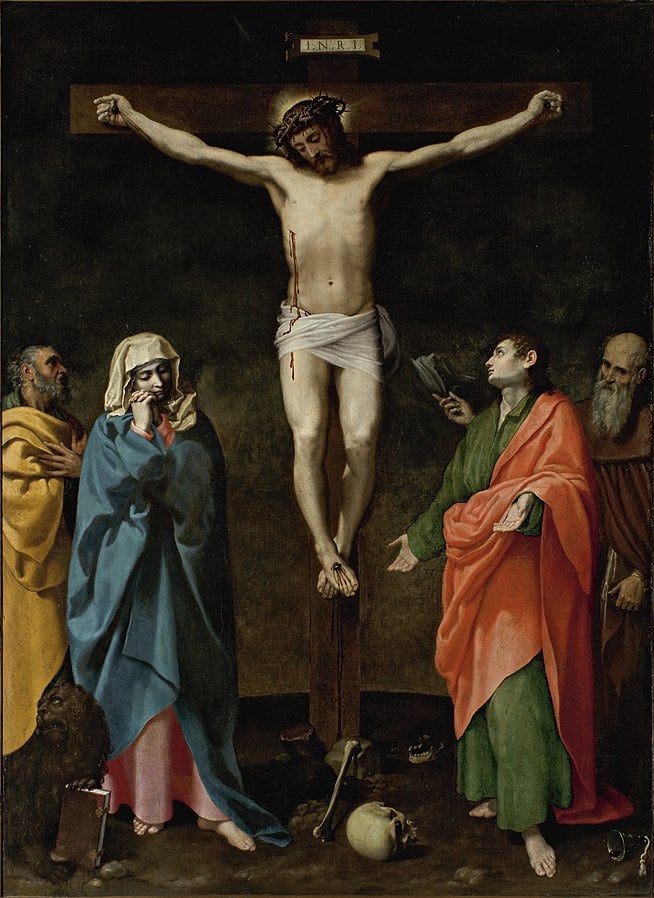In this series I have introduced the brief prayer, doce me passionem Tuam—teach me Your suffering—a simple aspiration we can pray many times a day. I also offered some suggestions on preparing for a Consecration to the Most Holy Cross of Jesus that you can pray today on Good Friday, which I am publishing here, along with this final article in the series. The great paradox of our faith is that the scandalously brutal Cross of Christ became the most beautiful, powerful, and liberating symbol of love the world has ever known.
In his underappreciated classic work, The Holy Ways of the Cross, the 17th Century spiritual writer Henri-Marie Boudon wrote, “The cross ought to be all our philosophy and all our theology, all our knowledge and all our love.” Simple souls who experientially know the Cross of Christ have more wisdom than the wisest pagans who are ignorant of the Cross. While it may sound ludicrous to say this, the friends of the Cross are wiser even than Socrates, Aristotle, and Plato combined. After all, what is the value of knowledge and wisdom if it does not lead us to that which is most true and most good?
In knowing the Cross of Christ, a believer knows the most profound truths of existence. Jesus is the great “I Am,” truth and goodness incarnate, and everything we seek to learn and know should lead us eventually to Him. As St. Thomas Aquinas taught, even the tiniest sliver of knowledge of divine things surpasses complete knowledge of human things. The New Testament reveals that deepest wisdom is found only in the Cross of Christ: “For Jews demand signs and Greeks seek wisdom, but we preach Christ crucified,” St. Paul writes, “a stumbling block to Jews and folly to Gentiles, but to those who are called, both Jews and Greeks, Christ the power of God and the wisdom of God” (1 Cor. 1:23-24).
As I mentioned in the opening article in this series, my work as a psychiatrist frequently reminds me that everyone suffers. Certainly, some people suffer far more than others, but in a fallen world some degree of suffering is unavoidable for everyone. We rarely know how and to what extent other people suffer, because the worst forms of suffering are often hidden. But as I have tried to show in these reflections, even a life of tremendous suffering—if it is lived in Christ, with Him, and through Him—is a life of freedom.


If we want to follow Jesus, we cannot shun the crosses He sends us daily. Our Lord wants all of His disciples to embrace the Cross, as He instructed us in the clearest possible terms: “If any man will come after Me, let him deny himself, take up his Cross, and follow Me” (Mt. 16:24). What does this mean for us? It means we cannot just endure with passive resignation the suffering in our own lives; we must actually learn to be thankful for it, for love of Him. Whatever He allows us to suffer is always sanctifying, always for our good, even when we do not immediately see the fruits in this life.
It is pointless to spend time wondering about or longing for the life I would have had, or the person I might have been, had I not endured the sufferings that have shaped me. St. Josemaria Escriva referred to this trap as “mystical wishful thinking”—if only I had different parents, if only I had married someone else, if only I had a different profession, if only I were healthier, or younger, or older, and so forth. Such fantasies are at best a waste of time and at worst a temptation to abandon our vocation. Instead, I need to focus on the life I do have, which is only possible because of what I have suffered.
This is the life God has given to me, and insofar as it is from God, it requires my gratitude. To repeat, the life I actually have is the best life for me because it is from God. I am fully aware that this is difficult and challenging for us to understand and accept. To be clear, God does not ask us to like our suffering; but He does ask us to love the lives He has given to us—in good times and even in times that seem horrendous. God works all things for the good of those who love Him (cf. Rom. 8:28). To be sure, it may be hard to see this until we enjoy the perspective of eternity; but when we do, we will realize that even that which seemed bad, which felt unbearable, was working for our good.
While in college I took an entire course from a brilliant Christian philosopher on the problem of evil—the age-old question of why an all-good, all-powerful, all-knowing God would permit so much suffering in the world. Every person of faith wrestles with this mystery at some point—and not just as an intellectual riddle, but an existential, deeply personal question. Why did God allow my child to suffer a disabling brain injury? Why does God not cure my spouse’s cancer? Why am I afflicted with crippling depression or anxiety when I am trying to live a life of faith and devotion? Why does God permit false accusations and slander to ruin my family’s reputation? The ultimate answers to these questions are not found in any philosophical treatise. They are found only in the suffering of Christ. The answer is in the Cross.
I have treated many patients who believe that God is good, that He is loving and forgiving and merciful—except with respect to them. They believe that, despite how much they try to love and have faith in God, they might just be the only person Jesus didn’t redeem, the only person He will not forgive. They often know intellectually that God loves everyone, and this (theoretically) includes them; yet they doubt and reject His personal love for them in their hearts. They assume instead that their suffering is proof that God must despise them, or that He is ambivalent toward them, or that He needs to punish them for their faults.
Contrary to what they feel or venture to believe, everything they suffer is actually evidence of God’s tremendous love for them—for He allows His friends to share in His redeeming Cross. To be sure, sometimes we do suffer as a direct consequence of our sin, which tends to produce misery. (Sin is its own punishment, as the Christian theologian Augustine, and even the Pagan poet Ovid, observed). But personal suffering is not necessarily an indication that we have done something wrong, something deserving of God’s punishment. Even in that instance, just as a parent may chastise a young child who crosses the street without looking, such punishment is not because the parent does not care or love their child, but precisely because they do. And God is an infinitely wiser and more loving Father than any human parent.
The lessons in this series apply equally to the small and large sufferings of our lives—from the mundane everyday pinpricks and minor contradictions to the most horrendous anguish imaginable. Just as we should not assume we know what another person is suffering, we cannot compare one person’s suffering with another’s. The human heart is mysterious: our experience of suffering is always deeply personal and unique. I suffered for almost five years from constant crippling nerve pain from a spine injury; but how could I say that my pain was worse than that of my wife or son who suffer periodic migraines? It is pointless and unnecessary to ask such a question: only God knows. And in the end, it does not matter. What matters is that we turn our attention to the suffering Christ. This simple prayer helps shift our focus from our own suffering to His: doce me passionem Tuam—teach me Your suffering. For it is only in Our Lord’s sufferings that we are liberated from the burdens of our own.
In the Torah, the notion of consecration (Hebrew teleioũn) means “total dedication of something or someone to God.” If you have prepared during this Lenten season to make it well, this accompanying prayer of Consecration to the Most Holy Cross of Jesus can help you enter more deeply into the mystery of Christ’s redemptive suffering, so as to personally experience the healing and liberating power of His Cross in your life. For the Cross of Christ always leads to the Resurrection.
Author’s Note: This is Part 7, the final installment, in a weekly Lenten series on the Christian meaning of suffering and the Cross of Christ.
Image from Wikimedia Commons















